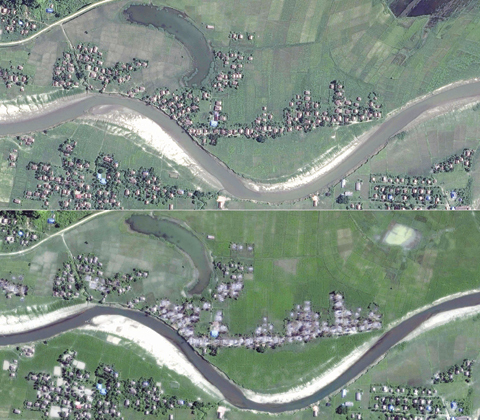Myanmar silent on whereabouts of detained journalists
 RAKHINE STATE, Myanmar: This combination of handout photos courtesy of Human Rights Watch/DigitalGlobe shows an analysis of satellite imagery revealing new destruction of Rohingya villages during October and November 2017. —AFP
RAKHINE STATE, Myanmar: This combination of handout photos courtesy of Human Rights Watch/DigitalGlobe shows an analysis of satellite imagery revealing new destruction of Rohingya villages during October and November 2017. —AFPYANGON: Myanmar's army said it found 10 corpses in a mass grave in a largely Rohingya village in Myanmar's northern Rakhine state, the epicenter of a violent military crackdown that triggered a mass exodus of the Muslim minority. Northern Rakhine has been gutted by violence that erupted on August 25, when the military launched a sweeping operation against Rohingya rebels who attacked police posts. Since then hundreds of villages have been torched and some 655,000 Rohingya have fled over the border to Bangladesh.
Doctors Without Borders says at least 6,700 Rohingya were killed in the first month of violence, while the UN has accused the army of waging an ethnic cleansing campaign with possible "elements of genocide". Myanmar, a mainly Buddhist country, has aggressively denied the charges and largely blocked off access to the conflict zone. Late Tuesday the army said it had exhumed 10 bodies in a grave discovered earlier in the week in Inn Dinn, a village in Rakhine's Maungdaw township. "An investigation is being carried out to uncover the truth behind the grave," said a statement published on the army chief's Facebook page, alongside blurred photos of skeletal bodies being dug out of a pit.
"Action will be taken according to the law if security members are found to be involved in the case," the statement added. One member of the team that unearthed the corpses told AFP, on condition of anonymity, that the bodies' state of decay suggested they had not been killed recently. "We cannot differentiate who the dead bodies were because we only saw their skeletons and bones," he said.
The discovery of the mass grave comes one week after the arrest of two Reuters journalists who have closely covered the crisis in Rakhine. The area has been out of bounds to the media since the military crackdown began with the exception of closely-monitored press trips organized by authorities. Myanmar has also blocked a UN fact-finding team from accessing the area to probe allegations of rights abuses. Myanmar reporters Wa Lone, 31, and Kyaw Soe Oo, 27, who have not been seen since December 12, have been charged for allegedly possessing documents relating to security forces in Rakhine. Their families, lawyers and colleagues have not been told where the two are, nor been allowed any contact with them.
Reuters did not immediately confirm what the journalists were working on or if their investigation was linked to the mass grave in Inn Din. The arrests have deepened concerns about fragile press freedoms in the emerging democracy. Human Rights Watch yesterday demanded the pair's immediate release, echoing similar calls from the EU, US and UN. "Their secret, incommunicado detention lays bare government efforts to silence media reporting on critical issues," said Human Rights Watch Asia Director Brad Adams. The reporters face a maximum sentence of 14 years in jail under the colonial-era Official Secrets Act.
UN envoy banned
Meanwhile the UN's rights envoy for Myanmar said yesterday the government had banned her from the country, adding her exclusion suggests something "awful" is happening in Rakhine state. UN Special Rapporteur Yanghee Lee had been due to visit Myanmar in January to assess the state of human rights across the country including in Rakhine, which was plunged into crisis by a military crackdown on the Rohingya minority Muslim community in late August.
Some 655,000 of them have fled for Bangladesh since then, with accounts of arson, murder and rape at the hands of soldiers and vigilante mobs in the mainly Buddhist country. The UN has accused troops of ethnic cleansing and possible "elements of genocide" against the Rohingya-charges the government vigorously denies as it faces intense global outrage. "I am puzzled and disappointed by this decision by the Myanmar government," said Lee, who is required to go to the country twice a year in order to report to the Human Rights Council and the UN General Assembly.
"This declaration of non-cooperation with my mandate can only be viewed as a strong indication that there must be something terribly awful happening in Rakhine, as well as in the rest of the country," she added. The South Korean academic said she was told the decision was based on a statement she made after her last visit to Myanmar in July, in which she sharply criticized the government's rights record and its treatment of the Rohingya. At the time the government criticized the statement as "biased and unfair". The UN confirmed Myanmar had withdrawn all cooperation for the duration of Lee's tenure.- Agencies










